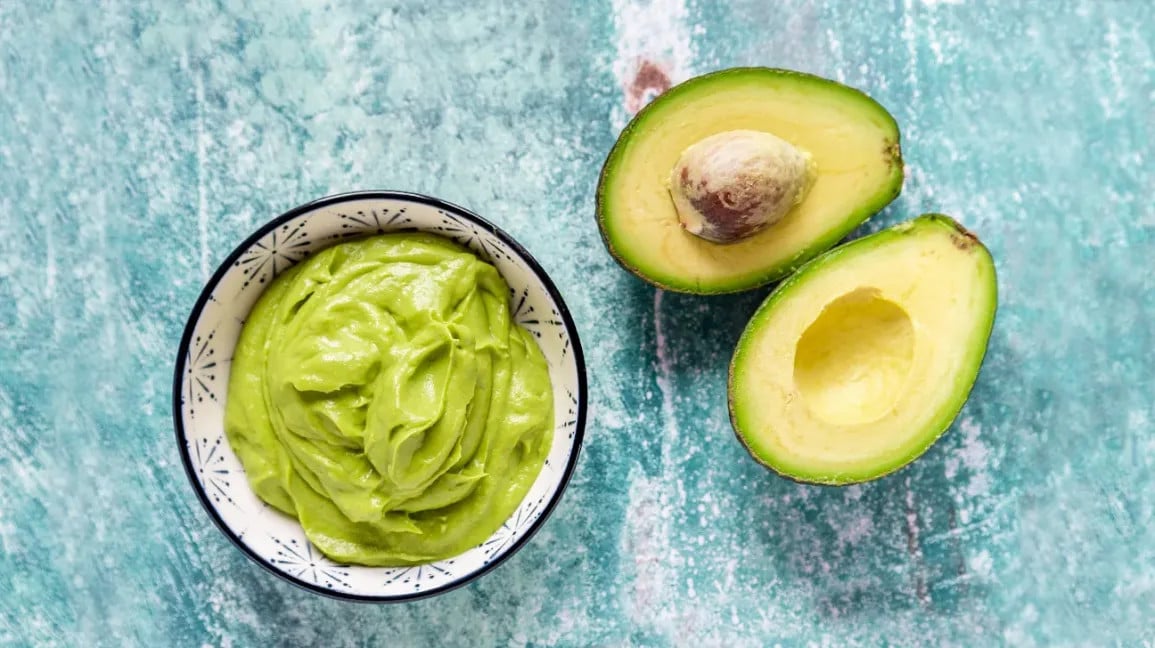These two fruits contain Omega-3 fats that help reduce bad cholesterol, are anti-inflammatory, and help reduce the risk of chronic diseases such as diabetes, heart disease, and some cancers.
Avocado
Avocado is known as a "superfood" originating from Mexico and Central America and is popular all over the world. Avocado contains nearly 20 vitamins such as vitamin A, B; and minerals such as magnesium, iron, copper, zinc, phosphorus, manganese; protein; healthy fats, low sugar... bringing many health benefits. Thanks to its outstanding advantages, avocado has become a food present in healthy diets, preventing and repelling diseases.
Avocados contain a lot of Omega-3, an anti-inflammatory substance that helps reduce the risk of chronic diseases such as diabetes, cardiovascular disease and some types of cancer.
Omega-3 helps improve brain function, reduce inflammation and increase skin moisture, thereby helping the skin to be healthier and smoother.

Omega-3 helps improve brain function, reduce inflammation and increase skin moisture, thereby helping the skin to be healthier and smoother.
Reduces inflammation related to cardiovascular disease, lowers cholesterol
Many studies have shown that oleic acid - a monounsaturated fat in avocados - helps reduce inflammation and reduce the risk of developing heart disease by helping to improve atherosclerosis and stabilize plaque.
A review of 10 studies found that avocado consumption can reduce total cholesterol by an average of 18.8 mg/dl, LDL cholesterol by 16.5 mg/dl, and triglycerides by 27.2 mg/dl from baseline. Furthermore, avocados contain nearly 20 times more fat-soluble phytosterols than other fruits, which may have positive effects on heart health.
Balance blood pressure
100 grams of avocado contains 485 mg of potassium, which helps maintain heart health and muscle function by regulating blood pressure through regulating water retention in the body. In addition, potassium regulates the electrolyte balance in the body. This is important for the transmission of electrical signals in the heart, helping to maintain a stable, healthy heart rhythm.
Support inflammatory conditions
A 2019 study identified the potential of avocado extract to fight inflammation, reduce the production of inflammatory compounds, and improve immune responses in chronic inflammatory diseases such as diabetes, Alzheimer's disease, and arthritis. Vitamin E found in avocados is also a powerful source of antioxidants with effective anti-inflammatory properties, supporting inflammation in the body.

Helps keep you full longer
A 2019 study found that the fat and fiber in avocados slows stomach emptying, nutrient absorption, and changes gut hormones to help you feel fuller longer after eating.
This property makes avocado a valuable food that helps reduce appetite, thereby reducing daily energy intake, thus helping with weight loss.
One study examined the nutritional patterns of Americans and found that people who ate avocados had more nutrient-dense diets, a lower risk of metabolic syndrome, and lower body weights than those who did not eat avocados.
Another large study, which looked at avocado consumption and tracked participants' weight over 4 to 11 years, found a lower rate of overweight, obesity, and weight gain in those who regularly ate avocados compared to those who did not eat this food.
Chicken eggs
Chicken eggs have higher nutritional value than many foods we eat every day. However, the amount of calories in chicken eggs is quite low. Therefore, it helps you easily control your daily calorie consumption as well as actively support weight gain/loss for many people.
Eggs contain cholesterol, but mostly good cholesterol, which helps protect the heart. Free-range eggs are rich in Omega-3, which helps reduce triglycerides. This is an energy-rich breakfast that will keep you full and active all morning.

In addition, chicken eggs also provide many vitamins and minerals such as vitamin D, which helps the body absorb calcium, good for bones and teeth; vitamin B12 is an important substance for the nervous system, blood cell production; choline supports brain function, brain development in young children and selenium has antioxidant effects, protecting cells from damage.
It can be said that chicken eggs are foods containing protein with the highest biological value and are considered the gold standard for nutrition in many current menus. 60% of high-quality protein in chicken eggs is in the egg white, the rest is in the yolk with other vitamins and minerals.
In addition, chicken eggs also contain vitamins A, E, B5, Omega 3 and some other minerals such as iodine, phosphorus... If comparing chicken eggs with other nutritious foods, the nutritional value of chicken eggs is 84.5% of milk, 76% of fish and 74% of beef.
Eggs are one of the best sources of Omega-3 fatty acids. A serving of 2 eggs provides an average of 180mg of Omega-3. Of this amount, 114mg is long-chain Omega-3 fatty acids, which accounts for 71-127% of the recommended intake for adults.
Oily fish is one of the most well-known sources of Omega-3s, however, for those who cannot eat fish, eggs are an especially useful source of these healthy fats.
Improve brain and nerve health
The amount of choline in eggs will help create Acetylcholine - a neurotransmitter, good for the brain's memory. In addition, the combination of choline, vitamin B2, B12 and tryptophan in eggs has the effect of reducing the risk of anxiety and depression, supporting deeper sleep.

Promote bone health
Eggs are one of the few foods naturally rich in vitamin D, making them a great choice for those who are deficient in vitamin D. This nutrient is important for the absorption of calcium and phosphorus, two minerals that help maintain healthy bones and teeth. Vitamin D also supports healthy muscle function and maintains a healthy immune system.
Typically, a serving of 2 chicken eggs provides about 82% of the recommended daily intake of vitamin D for adults. And this vitamin D content will depend on the farming process. Outdoor chickens will have 3-4 times more vitamin D than industrial chickens.
In addition, eggs also contain antioxidants that are good for the health of fingernails and toenails.
Prevent breast cancer risk
There is a study that shows that women who eat at least 6 eggs a week will reduce the risk of breast cancer by 44%. Eating eggs will provide many vitamins, minerals and antioxidants to the body. Therefore, it will provide the ability to inhibit free radicals, slowing down aging.
Limit calorie consumption, support weight loss process
Eggs are one of the best foods for weight management because chicken eggs only have about 70-80 calories and are high in protein. Egg whites in particular have even lower calories. They help to make you feel full longer and reduce the desire to eat late in the day, thereby limiting the amount of food consumed during the day.
Studies show that eggs help you feel fuller for longer by: Increasing levels of hormones that help you feel full after eating; Maintaining high energy levels; Increasing metabolic activity; Slowing the rate at which food leaves the stomach
Eggs are high in protein, making them an ideal addition to many weight-management diets. Consuming eggs also has long-term benefits in regulating your diet.
Eggs help maintain better eyesight
Eggs contain a variety of vitamins and minerals, including vitamin A, vitamin E and selenium. These are all important antioxidants that support eye health and retinal function. They help fight vision loss as we age.
Egg yolks are high in lutein and zeaxanthin, beneficial antioxidants that help reduce the risk of cataracts and macular degeneration. Studies show that these antioxidants are better absorbed from eggs than from alternative plant sources.
Source: https://www.baogiaothong.vn/buoi-sang-an-2-loai-qua-nay-giup-duong-tim-mach-giam-viem-boi-bo-suc-khoe-192241208093558293.htm


![[Photo] National Assembly Chairman Tran Thanh Man attends the Party Congress of the Committee for Culture and Social Affairs](https://vphoto.vietnam.vn/thumb/1200x675/vietnam/resource/IMAGE/2025/5/11/f5ed02beb9404bca998a08b34ef255a6)




![[Photo] General Secretary To Lam concludes visit to Russia, departs for Belarus](https://vphoto.vietnam.vn/thumb/1200x675/vietnam/resource/IMAGE/2025/5/11/0acf1081a95e4b1d9886c67fdafd95ed)



























![[Photo] Discover the beautiful scenery of Wulingyuan in Zhangjiajie, China](https://vphoto.vietnam.vn/thumb/1200x675/vietnam/resource/IMAGE/2025/5/11/1207318fb0b0467fb0f5ea4869da5517)
































































Comment (0)